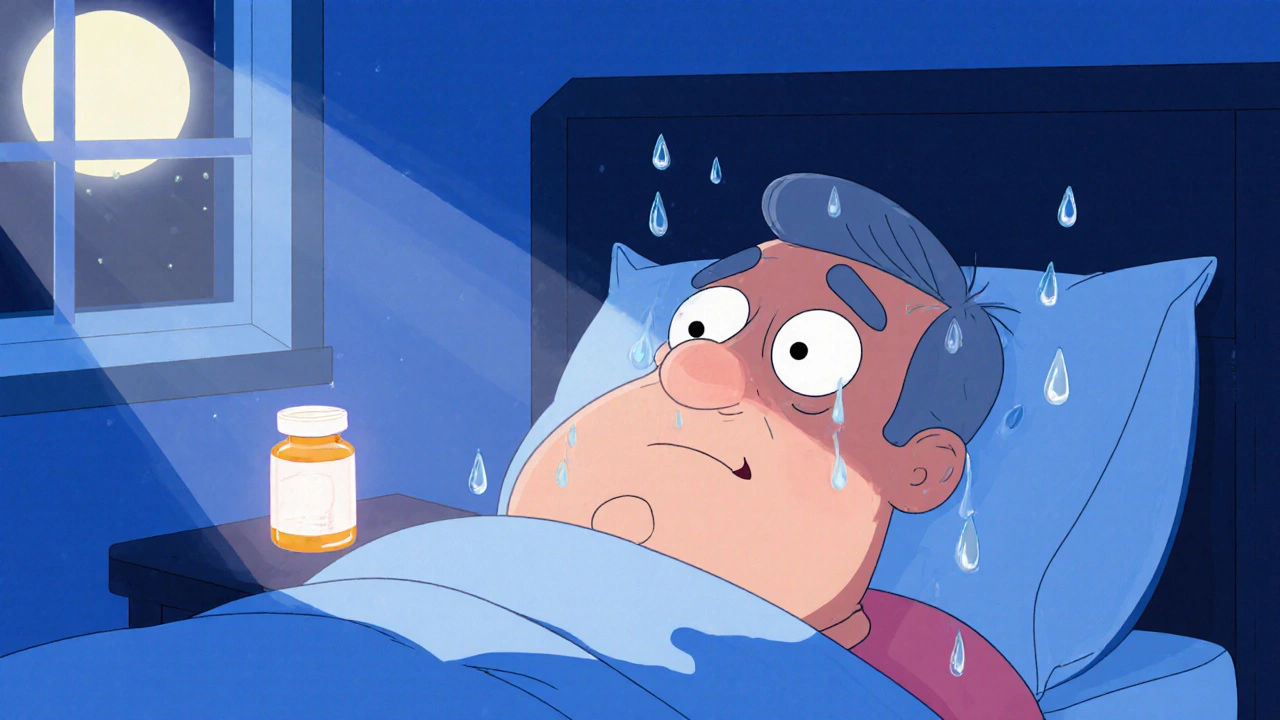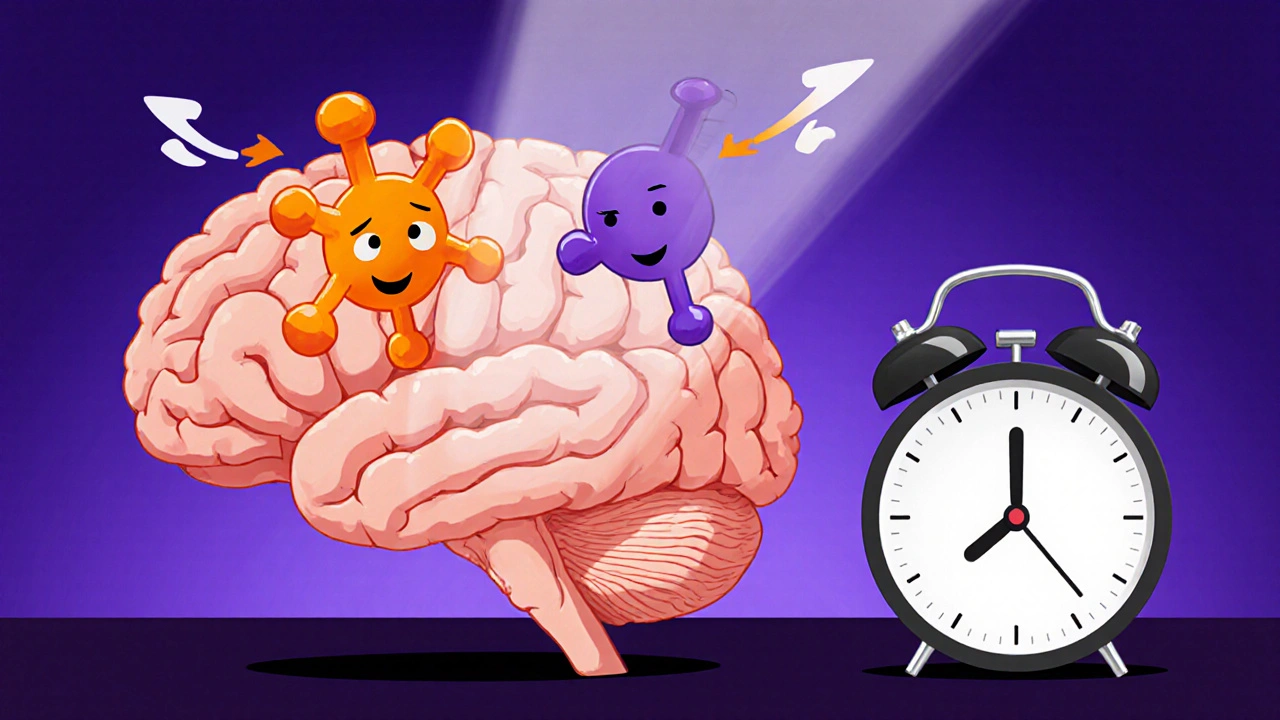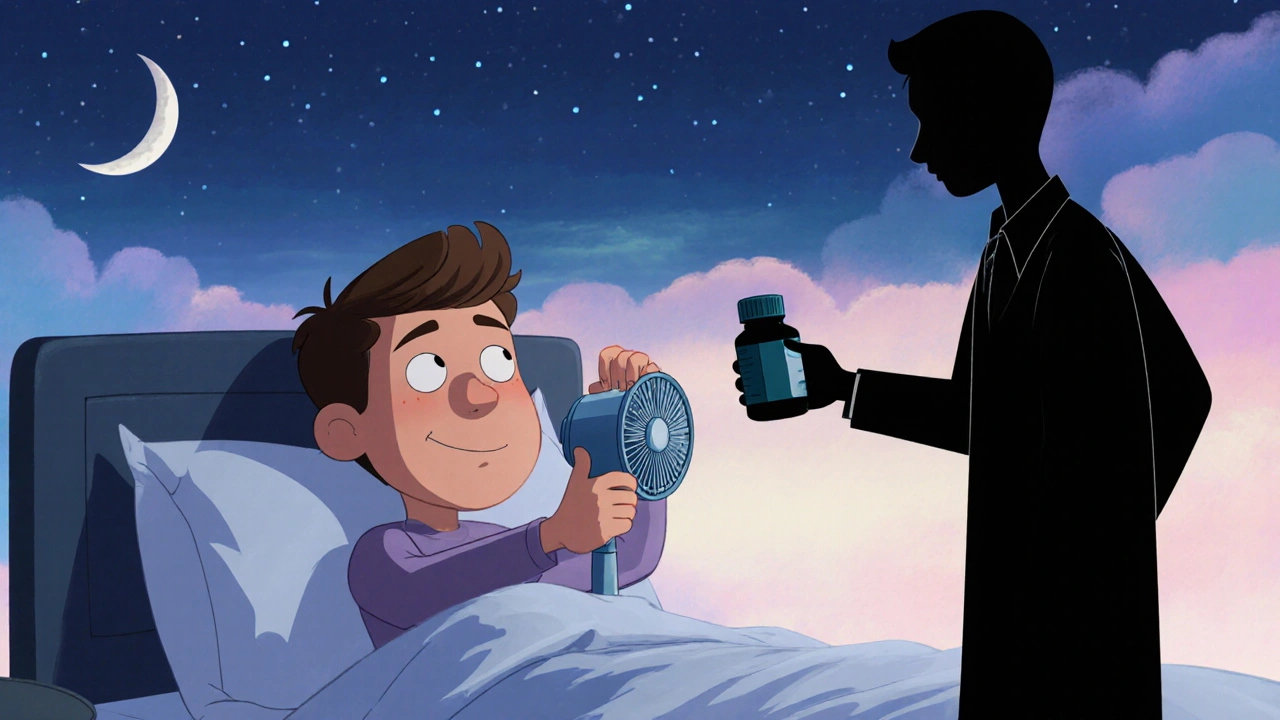Trazodone Night Sweats: Causes, Risks & Management
 Oct, 22 2025
Oct, 22 2025
Trazodone Night Sweat Risk Calculator
Assess Your Risk
Your Risk Assessment
When you’ve started taking Trazodone is a serotonin‑modulating antidepressant that’s also prescribed for insomnia, a sudden wave of sweat that drenches you while you sleep can feel like a nightmare you haven’t asked for. This guide breaks down why that happens, who’s most likely to experience it, and what you can do right now to keep the night cool.
Key Takeaways
- Trazodone can trigger night sweats because it affects serotonin and histamine pathways that regulate body temperature.
- Risk goes up for people on high doses, those on other temperature‑affecting meds, and anyone going through hormonal changes.
- Simple steps-adjusting dosage, timing, bedroom climate, and adding a low‑dose antihistamine-often calm the sweats.
- If sweats persist or are accompanied by fever, unexplained weight loss, or anxiety spikes, seek medical advice promptly.
- Alternative sleep aids such as low‑dose doxepin or cognitive‑behavioral therapy for insomnia (CBT‑I) may work without the heat.
What Are Night Sweats?
Night sweats are episodes of excessive sweating that occur during sleep, often soaking sheets and pillows. Unlike a regular warm night, they happen suddenly, can wake you up, and sometimes leave a lingering feeling of heat. While occasional sweating is normal, persistent night sweats may signal an underlying health issue or a medication side effect.
Common non‑medication causes include menopause, infections (like TB), hyperthyroidism, and anxiety disorders. When a drug is involved, the episode usually aligns with the time the medication peaks in your bloodstream.
How Trazodone Works (And Why It Can Heat Up)
Trazodone belongs to a class called serotonin‑receptor antagonists and partial agonists. It blocks the 5‑HT2A receptor while modestly boosting serotonin activity at other sites, which lifts mood and promotes sleep. At the same time, trazodone has a strong antihistamine effect-meaning it binds to H1 receptors, dampening the wake‑promoting action of histamine.
Both serotonin and histamine play roles in your body’s thermoregulation. Serotonin helps the hypothalamus set a temperature “set‑point.” When you take trazodone, the shift in serotonin signaling can temporarily confuse that set‑point, prompting the body to dump heat through sweat glands. The antihistamine side also reduces the brain’s ability to suppress sweating under certain conditions.
Why Some People Sweat More Than Others
Not everyone on trazodone will develop night sweats. Several factors tip the balance:
- Dosage: Higher nightly doses (typically >150 mg) raise blood levels enough to intensify thermoregulatory effects.
- Concurrent meds: Combining trazodone with SSRIs, SNRIs, or other antihistamines can amplify the temperature response.
- Hormonal changes: Menopause, perimenopause, or low testosterone can already make the hypothalamus more sensitive.
- Health conditions: Hyperthyroidism, diabetes, or chronic anxiety increase baseline sweat production.
- Lifestyle: Alcohol, caffeine, and heavy evening meals raise core temperature before bed.
Age matters, too. Older adults metabolize trazodone more slowly, so the drug stays in their system longer, extending the window for night sweats.
Practical Ways to Manage Night Sweats While Staying on Trazodone
- Check the timing: Take trazodone 30‑60 minutes before bed, not right at bedtime. A slightly earlier dose can shift the peak concentration away from deep sleep stages when sweating is most noticeable.
- Adjust the dose: If you’re on 150 mg or more, ask your prescriber whether a modest drop (e.g., 100 mg) still controls insomnia while cutting down the sweats.
- Optimize bedroom climate: Keep the room at 65‑68°F (18‑20°C) and use breathable, moisture‑wicking linens. A fan can improve air circulation without raising humidity.
- Hydrate wisely: Drink a glass of water before bed, but avoid large fluids that could wake you for bathroom trips.
- Add a low‑dose antihistamine: Over‑the‑counter diphenhydramine (25 mg) taken a few hours before sleep can counteract the histamine‑related sweating. Only use this short‑term and check with a clinician.
- Explore CBT‑I: Cognitive‑behavioral therapy for insomnia tackles the sleep‑stress loop without medication, often allowing a lower trazodone dose.
- Consider switching agents: If sweats persist, discuss alternatives like low‑dose doxepin (which has a milder effect on temperature) or melatonin.
Most patients see a noticeable reduction within a week of making one or two of these tweaks.

When to Call Your Doctor
Night sweats that:
- Last more than a few weeks despite adjustments,
- Are accompanied by fever, chills, or unexplained weight loss,
- Trigger anxiety attacks or panic during the night,
- Cause skin irritation or infections from damp bedding,
should prompt a medical review. Your clinician may order blood tests (thyroid, glucose, hormone panel) and consider tapering trazodone or swapping it for a different sleep aid.
Medication Comparison: Common Drugs Linked to Night Sweats
| Medication | Primary Use | Mechanism Linked to Sweats | Incidence (approx.) |
|---|---|---|---|
| Trazodone | Depression & insomnia | Serotonin & histamine modulation | 10‑15% at doses >150 mg |
| SSRIs (e.g., fluoxetine) | Depression & anxiety | Serotonin reuptake inhibition | 5‑10% |
| Antidepressant mirtazapine | Depression | Alpha‑2 antagonism, histamine blockade | 8‑12% |
| Vasodilators (e.g., nifedipine) | Hypertension | Peripheral blood‑vessel dilation | 15‑20% |
| Hormone therapy (estrogen) | Menopause symptoms | Hormonal fluctuations affect hypothalamus | 20‑30% |
The table shows that trazodone is not the only culprit-many drugs share the same thermoregulatory side effects. Knowing the mechanism helps you and your prescriber pick a drug with the lowest sweat risk for your situation.
Bottom Line
Night sweats while taking trazodone are a real but manageable side effect. By tweaking dose timing, improving sleep environment, and possibly adding a short‑term antihistamine, most people find relief without abandoning the medication’s sleep benefits. Always keep your doctor in the loop, especially if the sweats become severe or are paired with other concerning symptoms.
Can I stop taking trazodone if night sweats are bad?
You don’t have to quit abruptly. Talk to your prescriber about tapering the dose or switching to a different sleep aid. A gradual reduction reduces withdrawal risks and gives you time to monitor if the sweats subside.

Are night sweats a sign of an overdose?
Not necessarily. Overdose symptoms include severe dizziness, rapid heart rate, and fainting. If you suspect an overdose, seek emergency care. Night sweats alone usually point to a dosage‑related side effect rather than toxicity.
Do lifestyle changes help?
Yes. Cutting caffeine after noon, avoiding alcohol before bed, and maintaining a cool bedroom temperature can drastically lower sweat episodes. Even a simple adjustment like a breathable pajama set makes a difference.
What other medicines are known for night sweats?
SSRIs, mirtazapine, certain blood‑pressure drugs, and hormone‑replacement therapy often list night sweats as a side effect. The comparison table above outlines typical incidence rates.
Should I get blood tests?
If sweats persist despite adjustments, your doctor may order thyroid function, fasting glucose, and hormone panels to rule out medical causes unrelated to medication.
John Connolly
October 22, 2025 AT 20:00If you’ve been battling night sweats on trazodone, you’re not alone. The good news is that simple tweaks can often make a big difference. Start by evaluating the timing of your dose; taking it a bit earlier can shift the peak away from deep sleep stages where sweating spikes. Cutting down the dose by 25 mg, if your prescriber agrees, frequently reduces the heat without sacrificing sleep quality. Pair these changes with a cooler bedroom and breathable linens, and you’ll likely notice relief within a week.
Wade Grindle
October 24, 2025 AT 13:40Night sweats associated with trazodone are primarily mediated through serotonergic and histaminergic pathways. The literature indicates that doses exceeding 150 mg per night increase the incidence to roughly 10‑15 %. Adjusting the administration time by 30 minutes can attenuate the thermoregulatory response. Maintaining ambient room temperature between 65‑68 °F further supports symptom mitigation.
Sameer Khan
October 26, 2025 AT 06:20From a pharmacodynamic perspective, trazodone exerts a dual modulatory effect on the serotonergic 5‑HT2A receptor and the H1 histaminergic receptor, both of which are integral to central thermoregulatory circuits. The resultant perturbation of hypothalamic set‑point dynamics can precipitate diaphoresis during nocturnal REM phases. Empirical data suggest a dose‑response relationship, wherein plasma concentrations surpassing the therapeutic threshold correlate with heightened sudoriferous activity. Concomitant administration of serotonergic agents, such as SSRIs, may synergistically amplify this effect via serotonergic potentiation. Moreover, endocrine fluctuations, particularly peri‑menopausal estrogen decline, sensitize thermoregulatory feedback loops, compounding the risk. Clinical mitigation strategies therefore necessitate a multifactorial approach: dose titration, temporal re‑scheduling, and environmental thermic control. Implementation of low‑dose antihistaminic adjuncts, for instance diphenhydramine 25 mg, offers peripheral antagonism of H1‑mediated sweating. Ultimately, patient‑centered titration under medical supervision optimizes therapeutic benefit while minimizing thermogenic adverse events.
Joanne Ponnappa
October 28, 2025 AT 00:00Keeping your bedroom cool can really help 🌬️. Try breathable cotton sheets and a fan to stay comfortable through the night.
Tiffany Davis
October 29, 2025 AT 17:40It may be worthwhile to discuss dosage adjustments with your prescriber. A modest reduction often lessens sweating without compromising sleep. Collaboration with your clinician ensures any changes are safe and effective.
Jai Reed
October 31, 2025 AT 11:20Listen, you cannot ignore the impact of timing on trazodone’s side effects. Take the medication at least thirty minutes before you lie down, not at the moment you hit the pillow. If the sweats persist, demand a dosage review from your doctor immediately. Your health is non‑negotiable.
WILLIS jotrin
November 2, 2025 AT 05:00That timing tweak you mentioned aligns well with the pharmacokinetic peak, which often occurs an hour after ingestion. By shifting the dose earlier, you essentially move the peak out of the deep sleep window where the hypothalamus is most vulnerable. This simple adjustment can therefore substantially blunt the sweat response without sacrificing the sedative effect.
Kiara Gerardino
November 3, 2025 AT 22:40It is utterly irresponsible to accept night sweats as a mere inconvenience; they are a glaring warning sign of systemic imbalance. One must demand rigorous scrutiny of any medication that dares to betray the body’s equilibrium. Settling for a “modest reduction” is a palatable lie that masks deeper physiological injustice. The moral imperative is clear: pursue a safer alternative and refuse to endure needless nocturnal torment.
Suryadevan Vasu
November 5, 2025 AT 16:20The peak‑time shift is clinically supported. It reduces thermogenic stimulus. Implement it promptly.
Vin Alls
November 7, 2025 AT 10:00Night sweats can feel like a midnight lava flow, but the good news is that the right tweaks can turn that inferno into a gentle drizzle.
First, consider the dose-trimming it by 25 mg often yields a noticeable chill without sacrificing the sweet lull of sleep.
Second, the clock matters; swallowing your pill an hour before you crawl under the covers nudges the drug’s apex away from the deepest REM stage.
Third, the bedroom itself is a silent accomplice; a thermostat set to 66 °F paired with a breezy fan can work wonders.
Fourth, swap out heavy flannel pajamas for lightweight, moisture‑wicking cotton to let your skin breathe.
Fifth, a splash of hydration-just a modest glass of water-helps your body regulate temperature without flooding the bathroom at night.
Sixth, if you tolerate it, a short‑term low‑dose antihistamine like diphenhydramine can blunt the histamine‑driven sweat signals.
Seventh, keep an eye on other meds; combining trazodone with SSRIs or other antihistamines can amplify the thermogenic effect.
Eighth, lifestyle tweaks such as skipping caffeine after noon and limiting evening alcohol can shave off unnecessary heat.
Ninth, chronic conditions like hyperthyroidism or hormonal shifts deserve a medical check‑up to rule out hidden culprits.
Tenth, documenting your sleep patterns and sweat episodes in a journal provides valuable data for your prescriber.
Eleventh, when you do visit your doctor, bring that journal and discuss the possibility of a slower taper or an alternative like low‑dose doxepin.
Twelfth, cognitive‑behavioral therapy for insomnia (CBT‑I) can sometimes replace the need for higher drug doses altogether.
Thirteenth, remember that every body is unique; what works for one may need tweaking for another.
Fourteenth, patience is key-most adjustments show benefits within a week, but give your system time to adapt.
Finally, stay vigilant for red‑flag symptoms such as fever, weight loss, or persistent chills, and seek medical attention without delay.